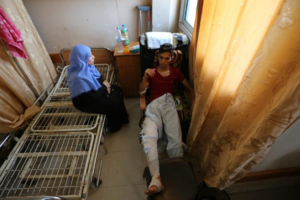WHO: ‘Unprecedented’ attacks against healthcare by Israel forces in 2018

Palestinians wounded by Israeli soldiers during a protest marking Nakba day receive treatment at European Hospital, Gaza City, 17 May 2018
Middle East Monitor reports:
A new World Health Organisation (WHO) report said 2018 saw an “unprecedented” number of attacks on healthcare by Israeli forces in the occupied Palestinian territory (oPt).
The report, “Right to Health in the occupied Palestinian territory: 2018”, launched this week in Ramallah at an event attended by senior diplomats, sets out to examine “obstacles to achieving the highest attainable standard of health for Palestinians living under occupation”.
According to Dr Gerald Rockenschaub, the head of WHO’s office in the oPt, “Palestinians in the West Bank and Gaza Strip continue to face major barriers to the realization of the right to health.”
“Sustainability of quality healthcare services is challenged by chronic occupation and fragmentation; restrictions on movement have a profound impact on access to healthcare, including for some of the most vulnerable Palestinian patients.”
The WHO noted that “Palestinians living under Israeli occupation in the West Bank and Gaza Strip are exposed to high levels of violence”, with 299 Palestinians killed by Israeli forces in 2018, and 31,723 injured (mostly in the context of Great March of Return protests in Gaza). Moreover, the WHO reported, 2018 saw “an unprecedented 432 attacks against healthcare in the West Bank and Gaza Strip”.
“In Gaza alone, three health workers were killed and 570 injured, 41 with live ammunition, while providing care to those injured in Gaza’s Great March of Return,” the WHO stated.
Meanwhile, “over a half of conflict-affected children may be affected by post-traumatic stress disorder, while the long-term consequences of injuries, with more than 6,000 live ammunition injuries in Gaza alone over the year, put strain on an already overburdened health system.”
Speaking at the launch event, United Nations Humanitarian Coordinator for the occupied Palestinian territory, Jamie McGoldrick, described a “dire humanitarian situation” for Palestinians. “No patient should have to worry about being prevented from accessing essential and lifesaving treatments, whether access to health facilities requiring Israeli-issued permits or access to essential medicines within Palestinian health facilities,” McGoldrick stated. “No health worker should have to go to work with the fear of being shot at and killed. WHO’s report underlines the immediate need for our collective efforts to strengthen the protection of healthcare.”
This article is reproduced in its entirety
